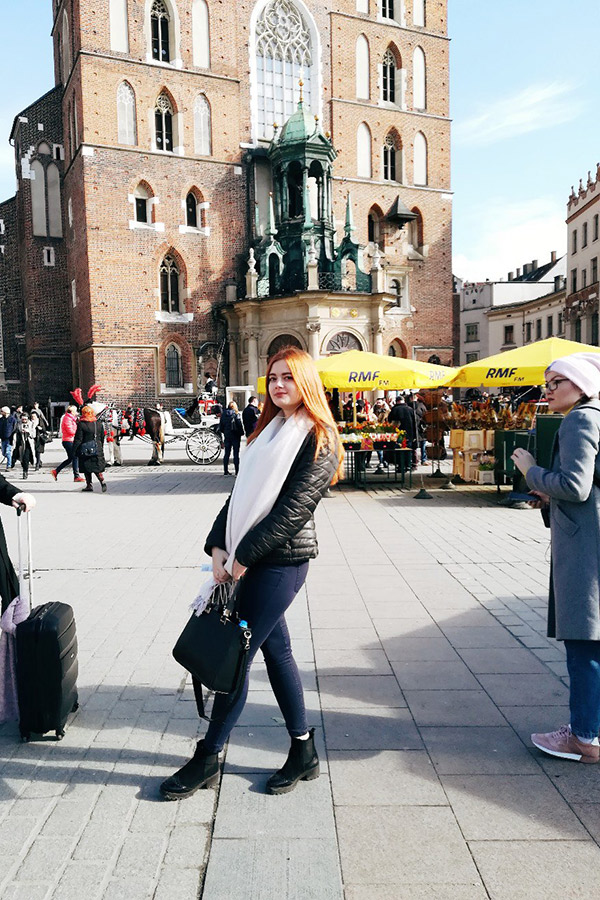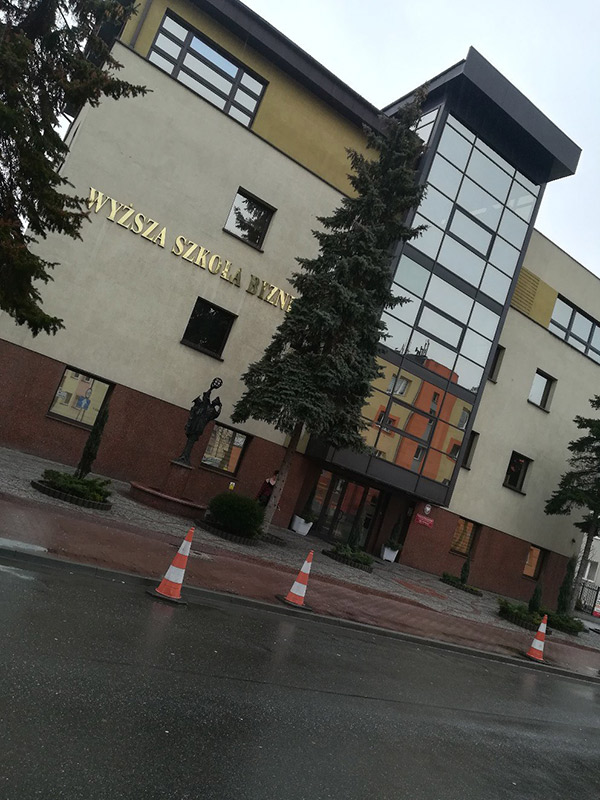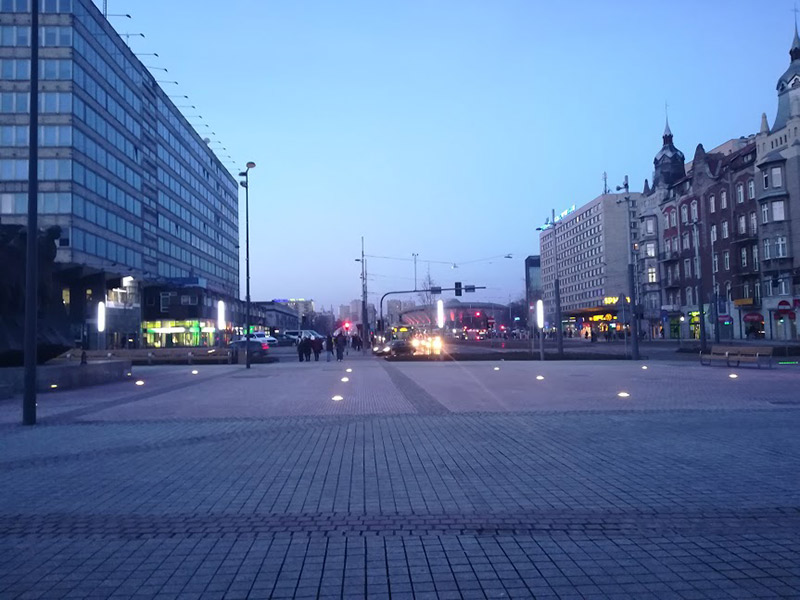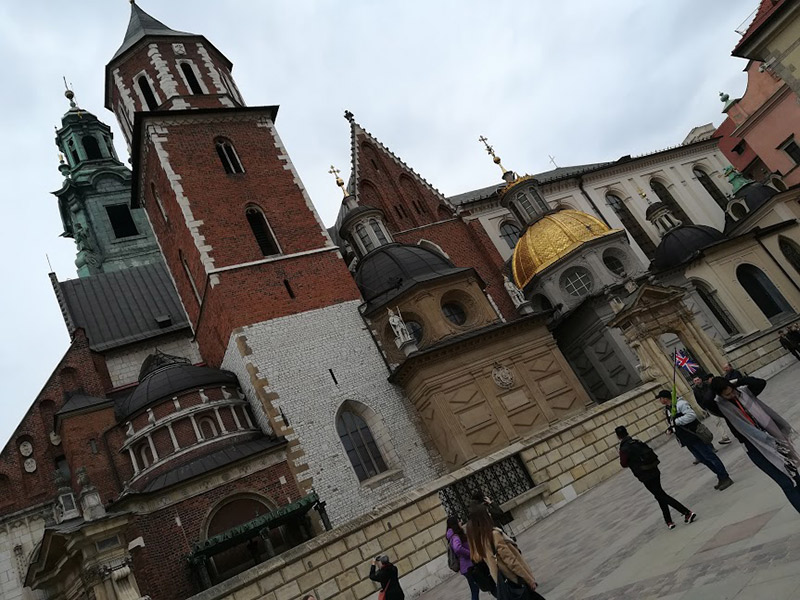The end of 2017 was highlighted with a staggering change in PSU education process. The university students have got a great opportunity of training at the University of Dąbrowa Górnicza during the second term, in spring (2017/2018). The project turned into life by within the framework of Erasmus+ and its academic mobility program. Currently the University of Dąbrowa Górnicza makes the top 10 among Polish universities concurrently working with foreign students all over the world. Following Erasmus+ study program renders incredible possibilities to practice foreign language as the courses are taught in English. What is more, the program provides a prospect to study at one of 50 universities of the European Union meanwhile receiving a scholarship. Most significantly, one may get a second diploma having an international status.
At the beginning of 2018, Alexandra Kruglova, a student at the Department of Business Accounting and Audit, Logistics and Management, went as far as to pave her way having started from picking the necessary documents to enter the program. For now, she is welcomed to share her impressions about the program possibilities, study process, people and their attitude to foreign students:

Interviewer: Which courses did you take at the University of Dąbrowa Górnicza?
A.Kruglova: Well, Erasmus+ offered three study fields: project manage-ment, information technologies and international relations. As I am a future specialist in logistics, I’ve been interested in gaining knowledge in the sphere of project management. That’s why it was not a hard choice. Sooner there was a list of subjects to choose. I’ve selected the following: Business English, Introduction to Project Management, Economic Trends, Project Management Technologies, Excel and Statistics.

Interviewer: Could you tell about the process of collection and submission all the documents necessary to enter an international program?
A. Kruglova: During my examination period I turned to collecting the documents: motivation and recommendation letters, a partner university curriculum, a list of grades and a certificate evaluating my English level. That was not an easy, as I had to pass my exams. Then I submitted the documents. Two days later I was informed I fit the program requirements, so I got it! The last step was about getting a visa, an approval and so on. I had only three weeks to deal with all, so that seemed to be hopeless. But I’m very thankful to PSU, especially to the Department of Business Accounting and Audit, Logistics and Management dean`s office; our dean Anna Lavrinenko, our Faculty`s Dean; Elena B. Maley, Head of the Department and to the International Office staff members. These people boosted the process.
One more requirement was to create your own curriculum and get the lecturers conformation. It was easy as everyone was welcomed to help me. The most terrifying part was the submission of documents for a visa. So I had to visit Polish Visa Centre twice because firstly they denied having told that they did not provide visa D (national visa) which was necessary for education purposes. My second attempt was fortunate: I could get the visa by February 26, the day of my departure.

Interviewer: What was your first impression when you went to the University of Dąbrowa Górnicza? And what about such a moment as adaptation?
A. Kruglova: WSB International Department helped me while my perpetual running with documents. They tried to answer all my questions. The University provides hostel in a neighbor city Katowice. On February 26, a «Welcome Party» for Erasmus students was held, but I did not manage to attend. Also, on February 26, there was an introduction and the University presentation. Unluckily, I did not visit it as well.
Every student following Erasmus+ program is provided with a body mentor, a student supervisor. This person is going to help you to overcome an adaptation period. My student supervisor`s name is Zaur, he is a postgraduate student. I immediately sent him an e-mail and then messaged on Vkontakte. He explained me everything and gave the information I needed.
There are plenty variants how to get to Katowice or Dąbrowa: by plane, by bus, by train. I decided to travel by bus. Zaur met me at Katowice railway station and then we went to the hostel (which is 10 minutes drive from the centre). My roommate is from Vietnam. The room is bright and spacious. I left my luggage and we head off to the University. The road from Katowice to Dąbrowa takes approximately 30 minutes.
We arrived at WSB and right after we went to the International Department. There we met Katya and Dominika who coordinated me the whole time. I was really pleased to know them. They explained me how the things worked and how to cope with all the stuff. I got a student identification card, some brand souvenirs and a half of my monthly scholarship (the second half is to be sent on the credit card).

Interviewer: Alexandra, could you tell us a bit about the study process at WSB? Did you feel the language barrier?
A.Kruglova: I’ve found out that the University tries to adjust to its students. Most of them both work and study so the classes are held only three times a week (on Wednesday, Thursday and Friday). There is no stable curriculum. For instance, I have two weeks of project management classes and the course continuation is put at the end of the month. The classes may be provided twice a week but their quantity will vary upwards. You learn independency – the one that we badly need in Belarus I guess. Besides, the classes are mostly aimed at gaining practical knowledge. «First of all, we teach you to be a customer, not a producer», as our teachers used to say. I have no difficulties with understanding English. At PSU I took the English advanced study course which provided me with a good grounding.
As a way to get an access to the examination, a group is split into several groups. Each group is to prepare a project on a chosen topic. The way of passing the examinations depends on students’ choice: whether it will be a test, open questions, another project preparation, etc. The thing I adore is a multicultural environment: starting from the Peruvians to the Kazakhs. They always share their experience and telling about the countries they live in.
Interviewer: So is there any event supporting students’ cooperation?
A.Kruglova: Yes, there are a great range of events arranged for this pur-pose. For example a «Multilanguage day» which is provided every Wednesday. Students rent a pub where they may communicate, ask questions, share ideas and all sorts of things.
The University of Dąbrowa Górnicza collaborates with the agency «Master tur», which offered students free Krakow sightseeing tour.
Interviewer: How do feel about the University of Dąbrowa Górnicza now?
A.Kruglova: I have not passed my examinations yet so I am really im-pressed by Poland and its possibilities. Until you are there you have all chances of not simply studying and improving your English but traveling.